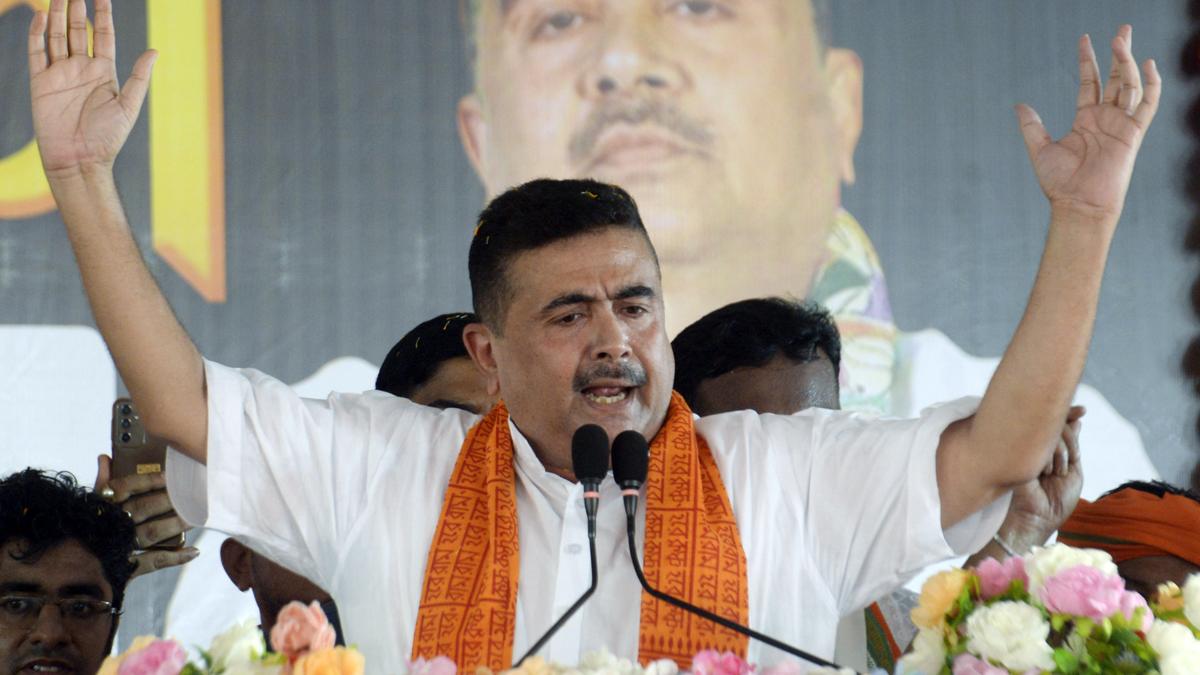At a small village in Tiruvallur district that even Google Maps hasn’t captured, a panchayat union primary school is fighting to survive. From one student last year, the number of students has increased to three this year.
Nestled at the end of a gravel road at Vellambakkam are three new buildings. One is for the school, another is for a library, and the other is for a self-help group. A temporary teacher has been deputed since last September to teach all the classes and an assistant principal-in-charge has been sent from another school. Two students joined a day after the school reopened on June 2 this year.
B. Rejina, 10, from Vellambakkam is the only student from last year. “Last year, it was very boring as I was the only student. Now, Sandhya is my best friend,” Rejina says, pointing to Sandhya who joined the school recently. When Rejina and Sandhya finish Class V this year, R. Sangeetha will be the only student left in the school.
The teacher says that only last year did the enrolment drop to one student. “The School Management Committee member, residents, and Rejina, too, came along for door-to-door canvassing and distribution of pamphlets, but parents were not willing to enrol their children here,” she says.

The enrolment was down to one student last year. Two students joined a day after the school reopened on June 2 this year. | Photo Credit: Special Arrangement
On the reopening day, only Rejina turned up for school. Soon two other children joined. Their families had shifted to the village in search of work as tree-cutters. “We are now canvassing. The nearby Mettur Colony has no school, and three children from there would join too,” the teacher adds.
S. Balaganapathy, Rejina’s father, says there were 13 students two years ago. “Last year, there were two students, including my child. But the other child left in two months. We wanted to shift Rejina when she was the only student, but we decided to wait as the school is nearby.”
M. Shanthi, the 59-year-old cook, has been the only permanent fixture at the school. “About 15 years ago, I used to cook for 40 children. Even if it’s one student, I come and cook,” she says, adding ‘dal’ to the mango sambhar brewing in the pot.
Fight for education
The school was built 20 years ago. Vellambakkam residents say they fought hard to get a school established and a road laid in the village. “Our leader at that time brought us together to demand education and amenities. All of us fought for the school and the Anganwadi. I studied there, and my boys too,” says Gowri (name changed), a resident.
Then why is the school struggling for enrolment? Residents attribute the problem to the dwindling population and the parents’ preference for private schools. “Almost all of us studied at the Vellambakkam Panchayat Union Primary School. But once we got degrees, we had to go out for jobs. Most houses in the village are abandoned as people leave for better opportunities,” says Raja, 35, pointing to a dilapidated house next to his.
According to the 2011 Census, Vellambakkam had 297 people with 81 huts. Residents say that today, the number of houses has come down to 35-40. “As there are no roads in the village, except for the main road, the parents are attracted by the transport offered by the private schools. Further, as one school has classes till VIII or X, students would rather go there because there is no need to change school,” says Rajammal, 30, a resident.
The nearest private school is 1.5 km away. It offers education till Class 8 and transport. Hence, most parents enrol their children in that school. “It means safety with pick-up and drop at the doorstep,” says Rajammal. A government aided school is 4 km away, offering classes till XII, while a government higher secondary school is another 3 km away. Hence, many residents opt for the private or government-aided schools.
Selvi, another resident, says the primary school was their introduction to education. “In the last three years, the enrolment dropped from 10 to 5. All of us started canvassing. Urging the parents to enrol their children in the school, we would highlight the benefits of a government school. The school is good. But the parents fancy the neat ties, shoes, and vans of a private school,” she says.
About 500 metres away from the primary school is the Anganwadi, where there are 15 children. “Every year, I advise the parents to enrol their children in the government school, but they don’t listen,” says the Anganwadi teacher.
Meanwhile, Rajammal plans to enrol her 18-month-old child in the primary school. “She will study there like her father, but I hope the school survives until then.”
An official of the District Education Office hopes to increase the enrolment. “We are trying to increase it. But if our efforts fail, the school may be shut down.”
Decreasing enrolment
This is not the only school with one student. Ramanathapuram also has a primary school with one student. Even as the School Education Department has been intensifying efforts to enrol more students in government schools, many government schools have a low enrolment rate. Over 1.8 lakh students have joined government schools this year.
At the Project Approval Board meeting for the Samagra Shiksha Fund for 2025-26, the Union Ministry of Education recommended that Tamil Nadu’s School Education Department improve enrolment in government schools. Citing the UDISE+ 2023-24 report, it said 64% of the government schools in the State had only 37% enrolment, whereas 21% of unaided schools had 46%. It also pointed out that 3,481 primary schools had less than 15 students, while 39 schools had no enrolment at all.
Published - June 08, 2025 09:41 pm IST



.png)
.png)
.png)
















 2 hours ago
5
2 hours ago
5







 English (US) ·
English (US) ·